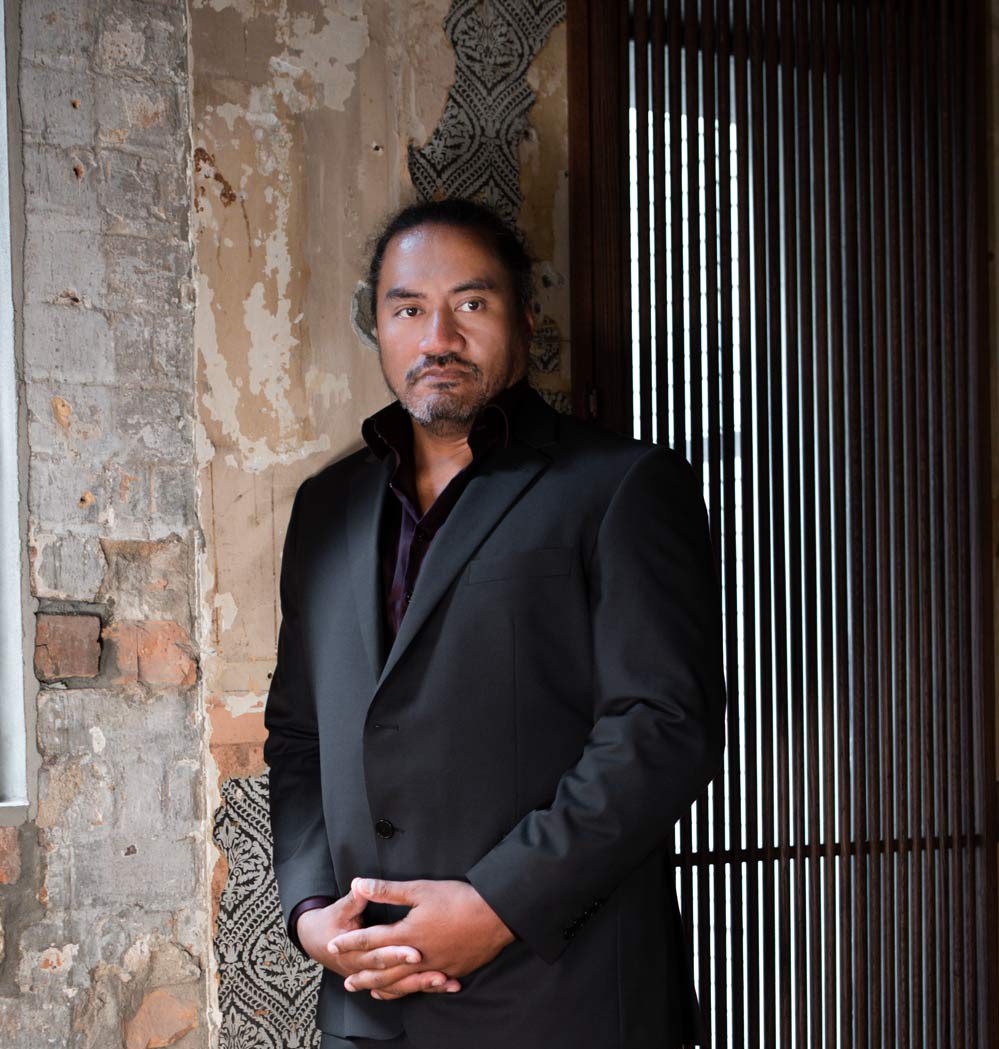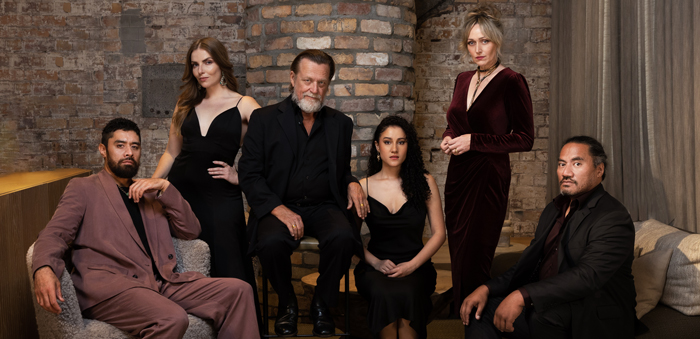
Culture Etc.
Playing Politics
After 20 years of prolific and professional acting, Fasitua Amosa’s face and voice have become well-known. Since 2019 he has added local politics to his repertoire, serving on the Whau Local Board.
By Gabi Lardies

Fasitua Amosa. Photo: Abhi Chinniah
In the final two weeks of June, the Duke of Albany will find himself surrounded each night by a cast of awful, greedy and power-hungry characters who will do anything for control and wealth. Daughters betray their father, brothers scheme against brothers, and an old man is pushed first to insanity and then to wander a heath in a storm. On the stage of Auckland’s ASB Waterfront Theatre, Shakespeare’s ultimate tragedy King Lear will unfold night after night.
In this production, Albany nears six feet, wears a dark blazer and slicks back his black hair. The character is portrayed by Fasitua Amosa — an accomplished actor on stage and screen, and deputy chair of Auckland’s Whau Local Board. He started performing as soon as he could stand, being one of five boys in a church-going Samoan family. Amosa considers Sunday School his first drama school, though many rehearsals took place at home where bad performances were met with flying jandals. Drama at Kelston Boys High followed, and then a Bachelor of Performing Arts at Unitec in Mt Albert. Since graduating in 2002, his face and voice have appeared in local and international productions. Local politics came later, once he’d bought a house with his partner in a suburb familiar to him, Avondale. His home is five minutes away from the early childhood education centre his mother founded, five minutes away from the church where his father was the minister for 10 years, and five minutes away from where his brother lives.
In this production, Albany nears six feet, wears a dark blazer and slicks back his black hair. The character is portrayed by Fasitua Amosa — an accomplished actor on stage and screen, and deputy chair of Auckland’s Whau Local Board. He started performing as soon as he could stand, being one of five boys in a church-going Samoan family. Amosa considers Sunday School his first drama school, though many rehearsals took place at home where bad performances were met with flying jandals. Drama at Kelston Boys High followed, and then a Bachelor of Performing Arts at Unitec in Mt Albert. Since graduating in 2002, his face and voice have appeared in local and international productions. Local politics came later, once he’d bought a house with his partner in a suburb familiar to him, Avondale. His home is five minutes away from the early childhood education centre his mother founded, five minutes away from the church where his father was the minister for 10 years, and five minutes away from where his brother lives.
Amosa began his second term as deputy chair of the Whau Local Board in November last year, a ward which covers New Lynn, Green Bay, Kelston, Rosebank, New Windsor and Blockhouse Bay as well as Avondale. He was inaugurated at the New Lynn Community Centre, a large, modern building which hosts comedy nights, Zumba, pottery markets and repair cafes. It’s exactly the sort of place that allows communities to thrive.
“A life of service is definitely something that my parents have modelled, especially my mother. Her big mantra is about service.”
“It’s not a bad thing to have been on TV a few times,” says Amosa, but it’s not all he chalks his votes up to. Rather than fame, it’s a familial entanglement with the community — his mother’s early childhood education centre, his father’s church, and his brother and cousin’s involvement in the Avondale Business Association.
“A life of service is definitely something that my parents have modelled, especially my mother. Her big mantra is about service — be useful to people and don’t be a pain. My mum’s over 70 and she’s not retiring anytime soon — she loves the kids and being able to influence their lives positively. Dad’s retired from being the minister, but he refers to himself as the community pastor. He’s on all sorts of community boards and initiatives. Recently he trained to be a census collector. He turned up one day with his lanyards and high-vis and clipboards, about to do his rounds.”
Service has led the Amosa family much further than the neighbours’ doorsteps. When Amosa was born in 1981, they lived in Wellington. His father, Asora, drove buses through the narrow winding streets. At the end of his runs, he would keep driving — taking homeless people to where they needed to go. Realising he had a deep calling for ministry work, the family moved to Dunedin, where Asora studied for four years at the Knox Centre for Ministry and Leadership. At the end of his training a “minister wanted” sign pinned on a noticeboard signalled their new home. They packed into their red Ford Econovan and drove to Pleasant Point, a farming community in South Canterbury that none of them had heard of before. “It was all sheep, potatoes and apples back then,” says Amosa. The parish, and the community, were Palangi. For six years Asora stood at the pulpit of Pleasant Point Presbyterian Church, and his sons became a choir. The boys would file to the front without knowing which hymn they would sing, until their father whispered its title. Then he would snap his fingers and they would begin.
From Pleasant Point, the family moved to West Auckland, where they found themselves surrounded by brown faces much like their own. Amosa, now a teenager, went from Pleasant Point High School to Kelston Boys High. Here, Samoan peers told him and his brothers that they sounded like white farmers, or like country bumpkins putting on British accents. As the pastor’s kids, Amosa and his brothers always felt they were held to a higher moral standard in their community, and this eventually led Amosa to rebellion. In the 1990s he decided to be a Blood, or rather, dress like a Blood. He wore large red T-shirts and a red bandanna backwards, modelled after Tupac. The phase stopped after a disagreement with his mum, in which the young Amosa definitively came away the loser. The bandanna was ditched but, as he grew older, he struggled with Christianity. It became hard for him to believe what he was brought up to believe. In his early twenties he slowly weaned himself off going to church. Now a typical Sunday might find Amosa fighting over chicken nuggets with his toddler, smashing buttons on a PlayStation remote or cycling alongside the Whau River.

Cast of King Lear. Photo: Abhi Chinniah.
Twenty years of acting, it seems, have taught Amosa important skills in diplomacy. In 2022, he was re-elected as deputy chair of the Whau Local Board. “When I first got the role, I wasn’t sure what I could bring,” he says. “To work together as a team is a really big thing, especially in theatre. You all have a “To work together as a team is a really big thing, especially in theatre.” JUNE 2023 common goal, and everyone might have a different take on how to get there, but eventually, you have to compromise and work out how to agree on a way forward to find the truth of each scene and work for the audience. That’s one of the gifts I bring to the local board. It’s a team effort, and we go forward together.”
During his first term he learned the processes of bureaucratic systems, and how and when to speak up and push back for the people he represents. He believes one of the biggest challenges facing the Whau ward is intensification, not because he’s a Nimby but because he wants to make sure “we don’t just build massive concrete jungles without thinking about the things that make a quality life”. Amosa cites shared social spaces like parks, bars, libraries, “cool community spaces”, and funds and grants to enable groups to “do their thing”. He sees his work on the board as akin to planting a tree he may never sit under himself, but knows one day will provide shade, and perhaps even fruit, to others.
King Lear begins with a foolish game. The king, ready to give up his power, commands his three daughters to publicly declare their love for him, so that he might divide his kingdom according to their flattery. When one daughter refuses to play the game, trouble starts. “When you’re in power, your people suffer if you’re playing games,” says Amosa. “The themes Shakespeare touched on are enduring.”
For some, politics is a game, and local politics a stepping stone. It’s not so for Amosa. His only drive is to know, be part of, and serve his community.
Gabi Lardies is our junior staff writer, a role supported by NZ On Air’s Public Interest Journalism.

This story appeared in the June 2023 issue of North & South.

